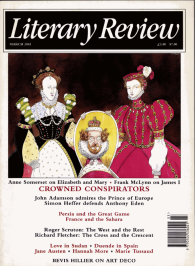Gillian Darley
Just Good Friends
Transformations of Love: The Friendship of John Evelyn and Margaret Godolphin
By Frances Harris
Oxford University Press 330pp £25
MARGARET BLAGGE WAS fourteen when her widowed mother arranged for her pretty youngest daughter to become a maid of honour to the Duchess of York. For the next seven years Margaret lived at court, serving first the Earl of Clarendon's daughter, and then Queen Catherine. Immersion in a world in which religion came perilously close to theatre and the worship of female beauty was paramount was testing for a pious girl. She found herself thrust into an unremitting life of public display, where the only comfort lay in the companionship with other girls in the same situation. Samuel Pevys described meeting the Duke of YO& entourage in carefree mood in the 1 spring of 1669 at the Treasurer's house in Deptford ('the ladies and all are of a gang'), as they camped out in the unfurnished house. Characteristically, John Evelyn was more impressed by Margaret's seemly I behaviour at church. H; wife, M~G, Margaret Blagge: amongst her first impressions of the seventeen-year-old, noted the 'extraordinary Charmes, marks of Vertue, & Discretion in her Conversation'.
It was three years later that the intense spiritual friendship between Evelyn and Margaret developed, after she had approached him for financial advice and he found himself, in his role as a Commissioner for the Sick and Wounded during the Dutch wars, spending long weeks at court in London.
In taking

Sign Up to our newsletter
Receive free articles, highlights from the archive, news, details of prizes, and much more.@Lit_Review
Follow Literary Review on Twitter
Twitter Feed
It wasn’t until 1825 that Pepys’s diary became available for the first time. How it was eventually decrypted and published is a story of subterfuge and duplicity.
Kate Loveman tells the tale.
Kate Loveman - Publishing Pepys
Kate Loveman: Publishing Pepys
literaryreview.co.uk
Arthur Christopher Benson was a pillar of the Edwardian establishment. He was supremely well connected. As his newly published diaries reveal, he was also riotously indiscreet.
Piers Brendon compares Benson’s journals to others from the 20th century.
Piers Brendon - Land of Dopes & Tories
Piers Brendon: Land of Dopes & Tories - The Benson Diaries: Selections from the Diary of Arthur Christopher Benson by Eamon Duffy & Ronald Hyam (edd)
literaryreview.co.uk
Of the siblings Gwen and Augustus John, it is Augustus who has commanded most attention from collectors and connoisseurs.
Was he really the finer artist, asks Tanya Harrod, or is it time Gwen emerged from her brother’s shadow?
Tanya Harrod - Cut from the Same Canvas
Tanya Harrod: Cut from the Same Canvas - Artists, Siblings, Visionaries: The Lives and Loves of Gwen and Augustus John by Judith Mackrell
literaryreview.co.uk